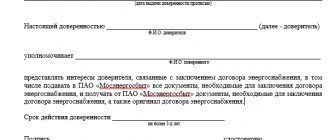A power of attorney for an apartment without the right to sell is issued in various cases when the owner, for some reason, cannot manage his own property. It allows you to give this responsibility to another person, but be sure that he will not sell the property: Rosreestr simply will not accept documents from him.
Let's look at what a power of attorney to manage an apartment without the right to sell is, when it is issued, whether you need to contact a notary and how much it will cost, as well as the procedure for canceling it if the owner wants to terminate it.
What is a power of attorney for an apartment with the right to dispose?
- Contents and sample of the power of attorney
A power of attorney for the right to use an apartment is issued by the principal (owner) to the attorney. In the future, he can use the property at his own discretion, but taking into account the opinion of the owner and the provisions of the power of attorney: it will indicate which actions can be taken and which cannot.
To issue a power of attorney without the right of alienation, several conditions are important:
- Age of majority of the principal and attorney, legal capacity. If one of the parties is between 14 and 18 years old, the document is drawn up with parental consent. Representatives may act independently on behalf of minor children under 14 years of age.
- The right of ownership of real estate, for the disposal of which a power of attorney is issued.
Important! According to Art. 185.1 of the Civil Code of the Russian Federation, any power of attorney for an apartment without the right to sell is subject to notarization. Instead of a notary, the unit commander can certify the document if it is drawn up by a serviceman; the head of the place of deprivation of liberty - for a person convicted of a crime; the head of a military treatment institution - for a serviceman undergoing treatment; the head of the social protection body - for an adult capable person who is supported there.
Take the survey and a lawyer will tell you for free how to avoid mistakes in an apartment purchase and sale transaction in your case
General power of attorney for real estate
To transfer powers to carry out activities with property belonging to a certain person, a power of attorney is issued. The document allows the holder to participate in property transactions on behalf of the owner.
What is a general power of attorney for real estate?
The legal system of the Russian Federation provides for three main types of documents:
- One-time: to perform a single transaction on behalf of the owner
- Special: for carrying out several actions related to property
- General: drawn up for the complete transfer of rights to dispose of real estate
By law, the right to sell can be transferred after signing the third type of document. The first two types are drawn up when it is necessary to transfer part of the rights relating to the collection of documents related to real estate.
Execute a general power of attorney with the right to sell at a notary according to the law - sample 2017
To avoid difficulties, the writer of the paper must take a responsible approach to filling out each of its parts.
Types of powers of attorney
The principal can issue any power of attorney depending on what he needs:
- One-time. Allows you to perform only one action. Immediately after this it is canceled.
- General. Gives the attorney complete freedom of action to dispose of the property; it is enough to indicate in it “without the right of alienation.”
- Special. It is drawn up when you need to make a list of similar actions. Valid until obligations are fulfilled or expiration.
Legal advice: if you need another person to “look after” the apartment legally, it is better to immediately issue a general power of attorney, making a note on it that it has no right of alienation (sale, exchange, gift).
Elena Plokhuta
Lawyer, website author (Civil law, 6 years of experience)
Duration of the power of attorney
If the power of attorney does not indicate a validity period, it is valid for one year from the date of signing (Article 186 of the Civil Code of the Russian Federation). The principal has the right to determine the term independently, as well as cancel it at any time.
For how long can a general power of attorney be given in Russia?
He is obliged to notify the authorized person of the decision, as well as all third parties known to him who entered into legal relations with him through a representative.
If a third party, who was not properly notified of the termination of the power of attorney and should not have known about such termination, entered into legal relations with the representative under the power of attorney, the rights and obligations arise for the principal.
Thus, setting the validity period of a power of attorney until it is revoked by the principal is a rather controversial way to terminate the power of attorney and quite difficult.
If the representative is provided with a wide range of powers with an unlimited number of persons, it is practically impossible to notify all counterparties, which makes it impossible to terminate the power of attorney.
A buyer who does not re-register a car after signing a general contract also risks it.
The seller can revoke the document at any time and take the vehicle; in the event of his death, the right to own the car will be inherited by the heirs.
If the buyer dies, the contract becomes invalid and the vehicle returns to the seller.
For real estate The general agreement for real estate gives the attorney the following rights:
- prepare and execute any documentation on behalf of the principal (lease agreement, donation agreement, purchase and sale agreement, exchange agreement);
- resolve all bureaucratic issues and organizational problems;
- personally participate in transactions and sign.
Often such a notarial document is issued for a specific property with an address, a clear description of the apartment, house, and information about state registration.
Maximum validity period of a general power of attorney. we analyze all the nuances
What is a general power of attorney? This is a paper of a certain type, certified by a notary, which gives one person (individual or legal entity) legal grounds to perform on behalf of another person various actions specified in the document.
Most power of attorneys have a validity period (maximum - 3 years), but there are also unlimited ones, which are rare, and notaries are reluctant to certify them. Only legally capable citizens can enter into such an agreement.
To whom it is issued A power of attorney can be issued to any individual with legal capacity or legal entity; current legislation does not put forward any restrictions on this issue.
The presence of the authorized person during the transaction is not mandatory; he can even be abroad and receive the paper by regular mail (by certified registered mail) or through a friend.
What is the maximum period for which a general power of attorney can be issued?
Important
The grounds under which a power of attorney issued by way of delegation did not require notarization were also changed.
Now this rule is applicable for powers of attorney issued in the order of substitution by legal entities, heads of branches and representative offices of legal entities. Possibility of subscribing powers of attorney certified in accordance with paragraph 3 of Article 185.
1 of the Civil Code by the organization in which the principal works or studies, or by the administration of an inpatient medical institution, is now completely excluded.
The time limits for notification of the fact of transfer of trust were not previously limited by law. Now the law requires that the person who issued the power of attorney be notified of the fact of reassignment within a “reasonable time.” Of course, such a formulation cannot be considered an effective incentive for the timely fulfillment of the prescribed obligation.
Maximum period for issuing a power of attorney: new rules
The role of the principal, as well as the role of the trustee for the registration of property rights, can be individuals and legal entities who are fully legally capable and capable.
The subject of a notarized power of attorney for registering an agreement for the transfer of ownership can be residential premises, land plots, buildings and structures, commercial real estate.
Based on this type of notarized power of attorney, the representative (trustee) has the right to register a contract of sale, gift or exchange.
The powers vested in the authorized person (representative) are determined by the principal.
When is a power of attorney issued without the right of alienation?
A power of attorney for real estate management may be needed in several cases:
- If you need to resolve issues about an apartment with municipal or state authorities.
- To resolve issues with housing and communal services authorities.
- To participate in homeowner meetings where signatures are required.
- For carrying out engineering communications, concluding contracts with service organizations.
- To carry out repairs in a house or apartment, if a contractor is hired under a contract. He will not enter into an agreement with a stranger without a power of attorney.
Note: the list of actions with real estate can be anything, the main thing is to reflect it in the power of attorney with the most precise wording. It is important that they cannot be interpreted in two ways.
Are you planning a deal to buy or sell an apartment?
Lawyers will answer any question regarding the transaction free of charge and in detail. Ask a question so you don't waste time reading!
How to issue a power of attorney for the right to dispose of an apartment?
The procedure for registering a power of attorney without the right of alienation consists of several stages:
- Choosing an attorney. It is important that this is a reliable person. Otherwise, the owner may have problems due to his actions.
- Visit to a notary. It's better to come by appointment. The presence of an attorney is not necessary: his passport data is sufficient.
- Signing a power of attorney and paying fees and notary services.
Finally, the notary will check and issue a certified power of attorney. It can be transferred to the attorney in any way: personally, by registered mail with a list of attachments and notification of delivery, through another person.
Contents and sample of the power of attorney
The power of attorney states:
- Full name, passport details, registration addresses, dates of birth of the principal and attorney.
- Apartment address.
- List of permissible actions of an attorney: renting out housing, obtaining documents from government agencies, etc.
- The wording “without the right of alienation”. It is not worth writing “without the right to sell”; this can be interpreted in two ways: in addition to sale, alienation of real estate is possible under an agreement of gift, exchange or rent.
- Is transference possible?
- Validity.
- Date of signing of the power of attorney.
- Signature of the principal.
- Signature and seal of a notary.
Documentation
The principal needs to provide the notary with a passport and an extract from the Unified State Register of Real Estate to confirm ownership. You will also need the attorney's passport details.
Expenses
According to paragraphs. 15 clause 1 art. 333.24 of the Tax Code of the Russian Federation, the amount of the state fee for a notary depends on the person for whom the power of attorney is issued. If for an adult son or daughter, spouse, parent, sibling, 100 rubles are charged. For a person who is not a close relative – 500 rubles.
Power of attorney for management and disposal of property
The citizen on the one hand trusts the citizen on the other hand to manage and dispose of all her property, no matter what it is and no matter where it is located.
POWER OF ATTORNEY No. _________ Done in __________________________________ " " ______________ (in accordance with paragraph 1, clause 1, article 26 of the Federal Law “Consular Charter of the Russian Federation”)
I, a citizen of the Russian Federation _______________________, gender female, ___________ year of birth, place of birth city __________, passport __________ issued by the Department of Internal Affairs “_________” of the city ________, date of issue: ___________ year, department code: _________, registered at the address: __________________________, general.
I trust the citizen of the Russian Federation ______________________, gender female, ___________ year of birth, place of birth ________ passport ____________, issued by the city police department. N______________ Autonomous Okrug _________ region __________ year, subdivision code: ___________, registered at address: _____________________________________
manage and dispose of all my property, no matter what it consists of and wherever it is located, in accordance with this, enter into all transactions permitted by law, in particular: sell, buy, accept as a gift, exchange, mortgage and accept buildings as collateral, etc. property, determining in all cases the amounts, terms and other conditions at its own discretion; make settlements on concluded transactions; register transactions and transfer of ownership with the State Registration Authorities, including the authorities that register rights to real estate and transactions with it; accept or refuse inheritances; conclude an Agreement on the determination of shares, receive Certificates of the right to inheritance by will or by law and register them, including with the authorities that register rights to real estate and transactions with it; receive property, money, securities, as well as documents due to me from all persons, institutions, enterprises, organizations, including the bodies that register rights to real estate and transactions with it, BTI, REU, Housing Office, DEZ, EIRTS, passport office, police department, guardianship and trusteeship authorities, Pension Fund, Committee on Land Resources and Land Management, Inspectorate of the Federal Tax Service of the Russian Federation, from all banks, telegraph mail for all reasons; manage bank accounts, receive postal, telegraphic, valuable and all kinds of correspondence and parcels; represent my interests before all individuals and legal entities of any form of ownership, including the bodies that register rights to real estate and transactions with it throughout the Russian Federation on the issues of concluding any types of agreements provided for by the legislation of the Russian Federation, including agreements social rental of residential premises and an agreement for the transfer of residential premises into ownership of citizens, for which I grant the right to perform on my behalf all actions necessary to fulfill this assignment, including submitting applications on my behalf, signing acts (including an act of dividing a share in kind , presented in the form of an act of implementation of an investment contract or a protocol of apartment distribution, or in the form of another document, an act of transfer of an apartment), necessary agreements, including a purchase and sale agreement, agreements and other documents, to hand over and receive registered documents (including a Certificate on state registration of property rights), submit additional documents (including applications for suspension, termination, renewal of state registration, for correction of technical errors, amendments to the Unified State Register);
if necessary, represent interests and act on my behalf in any arbitration courts, courts of general jurisdiction and other competent government bodies of the Russian Federation, and gives these persons all the powers provided by the legislation of the Russian Federation to carry out procedural actions to protect my interests, including the right to sign and filing a statement of claim and a response to the statement of claim, an application for securing a claim, changing the subject or basis of the claim, concluding a settlement agreement and an agreement on factual circumstances, signing an application for review of judicial acts based on newly discovered circumstances, appealing a judicial act, signing appeals and cassation complaints , their presentation, signing an application for review of a judicial act in the manner of supervision, its presentation, demands for compulsory execution of a judicial act, receiving, presenting and revoking a writ of execution, appealing against the actions of a bailiff, signing various petitions, responses to petitions, explanations and objections, delivery and receipt on my behalf of the necessary documents, including postal items. In accordance with the above, these persons have the right, at their own discretion, to sign, certify, confirm any documents, including statements of claim, appeals, cassation, supervisory complaints, make statements, reviews, make claims, counterclaims, complaints, petitions, demands, in including on set-off, enforcement, demand execution of decisions, decisions, orders, receive rulings, resolutions and court decisions, writs of execution or other enforcement documents, request to study documents, as well as study documents and records, make copies, perform all other lawful actions necessary for the above purposes or aimed at ensuring their achievement, pay the state or court fee and receive its refund.
In accordance with paragraphs. 1 clause 1 art. 26 of the Federal Law of the Russian Federation dated July 5, 2010 No. 154-FZ “Consular Charter of the Russian Federation”, a consular officer has the right to certify transactions (including contracts, wills, powers of attorney), except for contracts on the alienation of real estate located on the territory of the Russian Federation, and transactions aimed at alienating or pledging a share or part of a share in the authorized capital of a limited liability company established on the territory of the Russian Federation
This power of attorney is issued with the right of substitution and is valid for three years.
I certify the signature of the Principal ______________________ /____________________/.
_____________________________________________________________________________
___________________________________________________________________________________________________________________
___________________________________________________________________________________________________________________
How to cancel a power of attorney for the right to use an apartment?
Cancellation of a power of attorney is carried out in the same form as registration. The review must be certified by a notary. The principal can contact any notary office, and not just the one in which it was registered. The notary will still check the document through the register of powers of attorney and then certify the revocation. The attorney must be notified of this in advance.
Also, a power of attorney without the right to sell an apartment is canceled for other reasons:
- Expiration date.
- Death of the principal or attorney.
- Refusal of the attorney's obligations under the power of attorney.
- Compliance with the terms of the power of attorney.
Important! Cancellation is also possible if the attorney is declared bankrupt, if this deprives him of the right to represent the interests of other persons.
Do you need a purchase and sale agreement?
We’ll show you how to draw up a contract correctly and avoid mistakes.
A lawyer’s answers to frequently asked questions about a power of attorney for an apartment without the right to sell
When can a power of attorney be invalidated?
Cancellation of a power of attorney and invalidity are different concepts. It can be declared invalid through the court if actions have already been taken on it by a minor attorney. Invalidity occurs if it is signed by an incapacitated principal, a child 14-18 years old, without parental consent, or under the influence of threats.
In practice, this is extremely rare.
I want to register my spouse in an apartment for which a power of attorney has been issued for management. Is the owner's consent required?
It all depends on the content of the power of attorney. If there is a clause about registering other people, registration is possible.
I have ½ share in the ownership. Can I issue a power of attorney for a friend so that she pays utility bills and generally looks after the apartment? Do I need the consent of the second owner?
Yes, with shared ownership, it is possible to issue a power of attorney without the right to sell. The consent of the owner of the other share is not required.
The bailiffs imposed a ban on registration actions. I'm in another city. Can I issue a power of attorney for a relative so that he can resolve issues with the FSSP?
Yes. It must be pointed out that the power of attorney gives the right to represent interests in the FSSP and the courts, as well as the right to dispose of real estate without selling.
I have been renting out apartments to people for a long time. There are problems with the HOA due to receipts. Do I have to issue a power of attorney so that the tenant can handle all issues? Or will she be accepted on the basis of a rental agreement?
Responsibility to housing and communal services enterprises lies with those for whom contracts are drawn up with them. Most often this is the owner. They will not accept people into the HOA on the basis of a rental agreement; a power of attorney is required.




